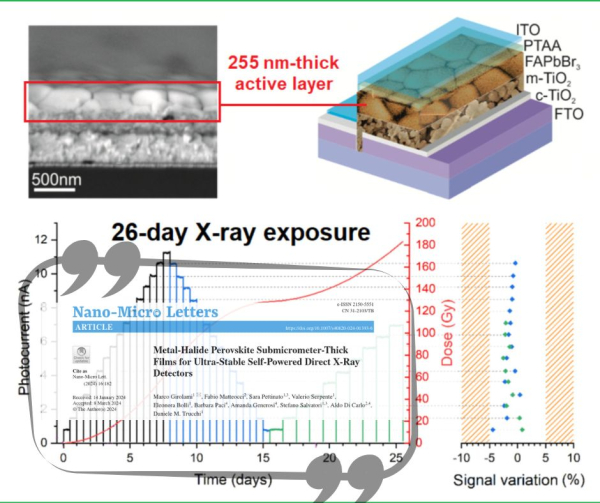Metal-halide perovskites are revolutionizing the world of X-ray detectors, due to the development of sensitive, fast, and cost-effective devices.
Self-powered operation, ensuring portability and low power consumption, has also been recently demonstrated in both bulk materials and thin films. However, the signal stability and repeatability under continuous X-ray exposure has only been tested up to a few hours, often reporting degradation of the detection performance.
In this study, performed in the framework of the project “PARIDE” (Perovskite Advanced Radiotherapy & Imaging Detectors), funded under the Regional Research and Innovation Programme POR-FESR Lazio 2014-2020), the DiaTHEMA Lab team of CNR-ISM, in collaboration with the CHOSE Center (University of Rome "Tor Vergata") and the University Niccolò Cusano, shows that self-powered direct X-ray detectors, fabricated starting from a FAPbBr3 submicrometer-thick film deposition onto a mesoporous TiO2 scaffold, can withstand a 26-day uninterrupted X-ray exposure with negligible signal loss, demonstrating ultra-high operational stability and excellent repeatability.
No structural modification is observed after irradiation with a total ionizing dose of almost 200 Gy, revealing an unexpectedly high radiation hardness for a metal-halide perovskite thin film.
Trap-assisted photoconductive gain enabled the device to achieve a record bulk sensitivity of 7.28 C Gy−1 cm−3 at 0 V, an unprecedented value in the field of thin-film-based photoconductors and photodiodes for “hard” X-rays.
Finally, the fabricated prototype has been validated as a dosimeter for radiation therapy for cancer treatment. Excellent results have been obtained under the high-energy (up to 6 MeV) X-ray beam produced by the medical linear accelerator installed at the Oncological Radiotherapy Dept. of San Giovanni Hospital in Rome.
Wednesday, 22 May 2024 15:53
Metal-Halide Perovskite submicrometer-thick films for ultra-stable self-powered direct X-ray detectors - A new paper
In this paper, published on Nano-Micro Letters, we show that self-powered X-ray detectors, based on FAPbBr3 255-nm-thick films deposited onto mesoporous TiO2 scaffolds, can withstand a 26-day X-ray exposure with no signal loss, demonstrating ultra-high operational stability. Sensitivity is evaluated to be 7.28 C Gy−1 cm−3, an unprecedented value for thin-film-based photoconductors and photodiodes for “hard” X-rays. Response of submicrometer-thick perovskite films to the X-rays produced by a medical linear accelerator used for cancer treatment is here demonstrated for the first time.
Published in
Publishing


 English (UK)
English (UK)  Italiano (Italia)
Italiano (Italia)